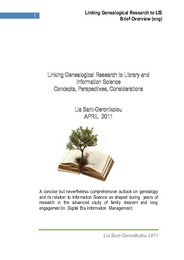Linking Genealogical Research to Library and Information Science : concepts, Perspectives, Considerations

View/Open
Date
2011Author
Σαντ-Γερονικολού, Σταυρούλα
Sant-Geronikolou, Stavroula
Metadata
Show full item recordAbstract
This essay is based on views and conclusions on genealogy and its relation to information sciences as shaped during long years of research inspired by both personal and experiental interest in the advanced study of family descent. It was a real challenge that, in order to become objectively comprehensive, I had to go beyond my personal preferences and practices, to the standards and culture of the best field professionals.
It was progressively enriched in the process, along with the reconstruction of the family chart, with opinions and conclusions, as set out in relevant articles and journals posted on the Internet and presented in the related bibliography. As stronger becomes, today more than ever, the need for more specialized genealogy books addressing moderate or advanced researchers aiming to produce quality work and the demand for more detailed information for genealogists that credit research more than the basic ability of the use and transcription of files, the texts that follow are an attempt of familiarization with the scientific subject of genealogy such as its importance (Chap.2), its academic position and relationship to other sciences (Chap.3 ), the possibilities of obtaining through the genealogical research experience professional accreditations, the demonstration of all of those features that clearly demarcate the line between amateurism and professionalism in the field (Chap. 5) and the extensive reference to private, higher institutions and certification, consultancy, training and evaluation professional bodies bold initiatives measuring both the progress of science and the quality and efficiency of work produced by setting standards of methodology, codes of ethics and professionalism. Also, special attention is paid to the important role of genealogy in the information literacy domain (Chap. 7) and the changes underway in recent decades to the public’s needs forcing information scientists and official bodies to a reassessment of skills - activities for the best service of genealogical research in archives and libraries (Chap. 4-6). In addition, effort has been made to highlight the complex relationships, interactions, differences and similarities between genealogists, historians, librarians and other information science professionals.
It should finally be noted that a collection of charts, photographs and documents has been included in the appendix at the end of the book to help better understand and complement the book contents. This edition is only a moderate first attempt to access the genealogy-in relation to library science theme as there are many more elements- to-come that could be incorporated into future efforts.